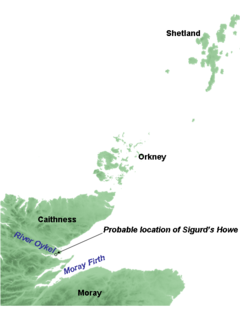 W
WEric Haraldsson, nicknamed Eric Bloodaxe, was a 10th-century Norwegian ruler. It is widely speculated that he had short-lived terms as King of Norway and twice as King of Northumbria.
 W
WSigurd Eysteinsson or Sigurd the Mighty was the second Earl of Orkney – a title bequeathed to Sigurd by his brother Rognvald Eysteinsson. A son of Eystein Glumra, Sigurd was a leader in the Viking conquest of what is now northern Scotland.
 W
WGunnhildr konungamóðir or Gunnhildr Gormsdóttir, whose name is often Anglicised as Gunnhild is a quasi-historical figure who appears in the Icelandic Sagas, according to which she was the wife of Eric Bloodaxe. She appears prominently in sagas such as Fagrskinna, Egils saga, Njáls saga, and Heimskringla.
 W
WHarald I Fairhair is portrayed by medieval Norwegian historians as the first King of Norway. According to traditions current in Norway and Iceland in the twelfth and thirteenth centuries, he reigned from c. 872 to 930. Supposedly, two of his sons, Eric Bloodaxe and Haakon the Good, succeeded Harald to become kings after his death.
 W
WRögnvald Kali Kolsson, also known as Saint Ronald of Orkney, was a Norwegian earl of Orkney who came to be regarded as a Christian saint. Two of the Orkneys are named after Rögnvald, namely North Ronaldsay and South Ronaldsay.
 W
WMáel Brigte, also known as Máel Brigte the Bucktoothed or Máel Brigte Tusk was a 9th-century Pictish nobleman, most probably a Mormaer of Moray. He was responsible – in a bizarre posthumous incident – for the death of Sigurd the Mighty, Earl of Orkney.
 W
WOlaf Tryggvason was King of Norway from 995 to 1000. He was the son of Tryggvi Olafsson, king of Viken, and, according to later sagas, the great-grandson of Harald Fairhair, first King of Norway.